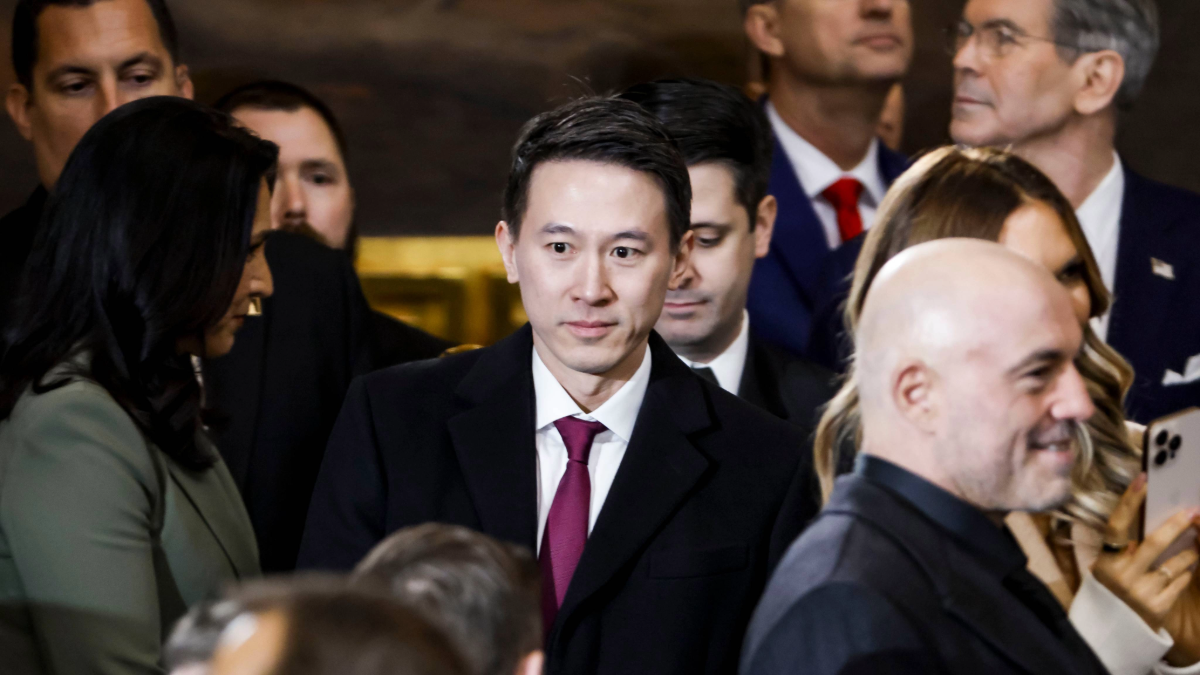Trump Issues Executive Order to Buy Time on TikTok Ban
Justin Hendrix / Jan 21, 2025
WASHINGTON, DC - JANUARY 20: Shou Zi Chew, the CEO of TikTok, arrives at the United States Capitol on January 20, 2025, to attend the inauguration of Donald Trump as the 47th President of the United States. (Photo by Shawn Thew-Pool/Getty Images)
Hours after being sworn in and amidst a slew of other actions and executive orders, on Monday, January 20, President Donald Trump issued an executive order intended to temporarily halt the enforcement of legislation targeting TikTok that briefly resulted in the app being unavailable to users in the United States over the weekend. The legislation, known as the Protecting Americans From Foreign Adversary Controlled Applications Act, sought to force TikTok’s China-based parent company, ByteDance, to divest by January 19, 2025, or face a ban on TikTok in the US.
"The unfortunate timing of section 2(a) of the Act — one day before I took office as the 47th President of the United States — interferes with my ability to assess the national security and foreign policy implications of the Act’s prohibitions before they take effect," President Trump's order says. "This timing also interferes with my ability to negotiate a resolution to avoid an abrupt shutdown of the TikTok platform while addressing national security concerns."
The order seeks to create a 75-day pause on enforcement to allow the administration to review the situation and determine its approach. It intends to:
- Provide retroactive protection for any actions taken between the law's deadline for a qualified divestiture (January 19, 2025) and the issue of the order;
- Establish that only the federal government, specifically the Attorney General, has the authority to enforce this law, blocking potential enforcement actions by states or private parties; and
- Require the Attorney General to formally document that no violations occurred during this period.
In a post on Bluesky, Minnesota Law School associate professor Alan Rozenshtein noted that the order does not invoke the 90-day extension provided for in the legislation, which presumably would have had to have been extended before Sunday.
Importantly, this [executive order] just boils down to a promise of non-enforcement. It's not the 90-day extension that the statute provides for in certain circumstances, which if Trump had tried to do would have actually immunized the providers for 90 days.
But a promise of non-enforcement may not be enough to satisfy lawyers at companies such as Apple and Google. While users can use the app, it remains unavailable for download in their app stores.
"Bottomline: if you're Oracle or Akamai, you're not feeling great tonight," observed Rozenshtein, referring to the companies that provide cloud data and content delivery services to TikTok. "This is extremely weak sauce in terms of a liability shield. Apple and Google's lawyers should feel good about their decision to boot TikTok off the app stores."
The order follows a whirlwind set of events that kicked off with a Supreme Court order on Friday, January 17, upholding the constitutionality of the Protecting Americans From Foreign Adversary Controlled Applications Act. The ruling affirmed the decision of the United States Circuit Court of Appeals for the District of Columbia. The Court found that the Act, which effectively bans TikTok in the US unless its Chinese parent company, ByteDance, sells it, does not violate the First Amendment rights of TikTok, its users, or creators.
Following the Supreme Court order on Friday, late on Saturday, January 18, TikTok users encountered a popup notification informing them that the app was unavailable:
Sorry, TikTok isn't available right now. A law banning TikTok has been enacted in the U.S. Unfortunately, that means you can't use TikTok for now. We are fortunate that President Trump has indicated that he will work with us on a solution to reinstate TikTok once he takes office. Please stay tuned!
On Sunday, January 19, President-elect Donald Trump took to Truth Social to promise an executive order to extend the time before legal prohibitions on TikTok take effect. The purpose of the order, Trump said Sunday, would be to give time for TikTok to negotiate a deal to resolve the question of its ownership, with some new party taking “a 50% ownership position” in a “joint venture between the current owners and/or new owners.” And, he noted, "Americans deserve to see our exciting Inauguration on Monday, as well as other events and conversations."
Later on Sunday, TikTok announced it would restore service to users, thanking Trump for "providing the necessary clarity and assurance" to service providers, such as Oracle and Akamai, on which it relies:
In agreement with our service providers, TikTok is in the process of restoring service. We thank President Trump for providing the necessary clarity and assurance to our service providers that they will face no penalties providing TikTok to over 170 million Americans and allowing over 7 million small businesses to thrive. It’s a strong stand for the First Amendment and against arbitrary censorship. We will work with President Trump on a long-term solution that keeps TikTok in the United States."
Users received another notification on the restoration of service:
Welcome back! Thanks for your patience and support. As a result of President Trump's efforts, TikTok is back in the US! You can continue to create, share, and discover all the things you love on TikTok.
Before President Trump issued his order, some Republicans took a harder line, promising the law would be enforced. For instance, on Sunday, Sen. Tom Cotton (R-AK) posted a hard line on X:
Any company that hosts, distributes, services, or otherwise facilitates communist-controlled TikTok could face hundreds of billions of dollars of ruinous liability under the law, not just from DOJ, but also under securities law, shareholder lawsuits, and state AGs.
The Protecting Americans From Foreign Adversary Controlled Applications Act was passed by Congress and signed by President Joe Biden in April 2024.
Authors
